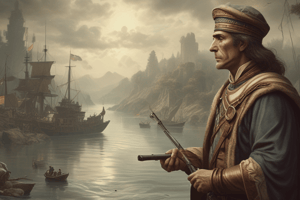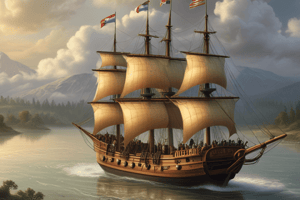Podcast
Questions and Answers
What do historians analyze in order to understand changes in history?
What do historians analyze in order to understand changes in history?
- Personal experiences of individuals
- Specific dates of events
- Artifacts only
- Patterns of change over time (correct)
What term is used to describe the practice of organizing events in the order they happened?
What term is used to describe the practice of organizing events in the order they happened?
- Historical
- Chronological (correct)
- Artifact-based
- Causal
Which of the following represents how we can understand the sequence of events?
Which of the following represents how we can understand the sequence of events?
- Thinking about what came first and so on (correct)
- Categorizing by significance
- Counting artifacts
- Measuring by length
What do artifacts help historians understand?
What do artifacts help historians understand?
Which terms help us represent time when studying history?
Which terms help us represent time when studying history?
Flashcards are hidden until you start studying
Study Notes
Understanding History
- History encompasses the narrative of people and significant events from the past.
- The timeline is divided into three key segments: the past, the present, and the future.
The Study of Time
- Studying history involves examining time and understanding changes and constants over periods.
- Events may overlap in different periods, highlighting the complexity of historical narratives.
Artifacts and Their Importance
- Artifacts are tools and items from the past that serve as evidence of historical human activities.
- They provide insights into how lifestyles and technologies have evolved over time.
Role of Historians
- Historians analyze significant changes in society and culture by identifying patterns throughout history.
- They investigate causes and effects to understand events better and their impact on society.
Chronology in Historical Study
- Chronological ordering is essential for studying history, as it arranges events according to their occurrence.
- Understanding the sequence of events involves considering what happened first and subsequent developments.
Time Measurement
- Time can be quantified using units such as days, months, years, decades, and centuries, facilitating the organization of historical data.
Studying That Suits You
Use AI to generate personalized quizzes and flashcards to suit your learning preferences.




